Andrew Collins's Blog, page 19
August 13, 2013
State: we’re in
 It is with some solemnity on Telly Addict that we reach the end of Friday Night Lights, which Sky Atlantic have very kindly shown from the start on a weekly, box-set basis, over the preceding 76 weeks; Peter Berg and his dedicated team certainly knew how to end the saga of a high-school football team (or two high school football teams), which wasn’t about high school football. Also, a new beginning for BBC1′s That Puppet Game Show (and hopefully a swift end); a return for the excellent, 80s-set The Field Of Blood to BBC2; part three of the temporally fractured Southcliffe on C4; and Jacques Peretti’s revealing The Men Who Made Us Thin on BBC2. Next week: Breaking Bad. Oh yes.
It is with some solemnity on Telly Addict that we reach the end of Friday Night Lights, which Sky Atlantic have very kindly shown from the start on a weekly, box-set basis, over the preceding 76 weeks; Peter Berg and his dedicated team certainly knew how to end the saga of a high-school football team (or two high school football teams), which wasn’t about high school football. Also, a new beginning for BBC1′s That Puppet Game Show (and hopefully a swift end); a return for the excellent, 80s-set The Field Of Blood to BBC2; part three of the temporally fractured Southcliffe on C4; and Jacques Peretti’s revealing The Men Who Made Us Thin on BBC2. Next week: Breaking Bad. Oh yes.


August 6, 2013
Bullets over Broadchurch
 It’s grim up Telly Addict this week. With C4 having made the strategic decision to own August, the historically authentic 19th century austerity reenactment The Mill began last Sunday, and this week it was joined to form a sort of wrist-slitting “theme evening” by Southcliffe, a fictional smalltown rent asunder by tragedy to sit alongside Broadchurch and, less fictionally, Hungerford and Dunblane. With a week having passed since the intrinsically disappointing finale of The Returned, also on C4 and also low on canned laughter, we tot up how many questions remain unanswered in that waterlogged Alpine hamlet; and, for double light relief from all this death and doom, on BBC1: competitive cookery with Celebrity Masterchef series eight, and codger crime-solving with New Tricks series ten (and the first episode of this hugely popular show I’ve ever seen).
It’s grim up Telly Addict this week. With C4 having made the strategic decision to own August, the historically authentic 19th century austerity reenactment The Mill began last Sunday, and this week it was joined to form a sort of wrist-slitting “theme evening” by Southcliffe, a fictional smalltown rent asunder by tragedy to sit alongside Broadchurch and, less fictionally, Hungerford and Dunblane. With a week having passed since the intrinsically disappointing finale of The Returned, also on C4 and also low on canned laughter, we tot up how many questions remain unanswered in that waterlogged Alpine hamlet; and, for double light relief from all this death and doom, on BBC1: competitive cookery with Celebrity Masterchef series eight, and codger crime-solving with New Tricks series ten (and the first episode of this hugely popular show I’ve ever seen).


July 30, 2013
Please tell us why you had to hide away for so long (slight return)

The facts: series one of Mr Blue Sky is being repeated on BBC Radio 4 Extra starting tomorrow. As regular readers will know, this was one of the proudest moments in my professional writing career, seeing my first solo sitcom commissioned by the BBC and for it to run to two series, on Radio 4 in 2011 and 2012. The happy cast-and-crew pic above is the series one line-up.
I wrote at length about the making of the first series in March 2011. Also, the terror of it going public in May 2011 and a general reflection upon the madness of putting yourself into the public domain. I duly blogged during the making of series 2 in March 2012. (These are not required reading or homework, I merely make them available again via handy links.) That series aired in April last year, since which, well … the end was nigh.
Getting the commission was one of the happiest moments of my career, especially after the long, slow journey it had been on, over a course of years, from inception to conception. It vindicated all the time put in, much of it unpaid and speculative, as per industry law. Equally, when we failed to secure a third series, having worked hard on a story breakdown for it, and allowed ourselves to get excited when we were called in for a meeting about the changes and given the wrong impression that we were in with a shout, it was one of the great disappointments of that same career. I would have loved to write some more for Harvey, Jax, Robbie, Charlie, Ray, Sean, Kill-R, Alan Leopold, Lou and the rest of the gang.
So, if you missed it, maybe have a listen. It won’t bring the show back, but it’s lovely to have it back in the public domain.


RIP BBC4 drama
 Yes, it’s quite a solemn moment on this week’s Telly Addict. The last ever BBC4 “karaoke drama” about depressed comedians, batty writers and drunk actors: Burton & Taylor. But what a curtain call! And what a fine, channel-defining portfolio it completes. (Well, not channel-defining any more, thanks to the Murdoch/Cameron project Delivering Quality First.) Also made by the BBC, Badults on BBC3, but I can’t review that for obvious reasons, so instead we welcome back Phoneshop for its third series to E4; also, something new, an Irish import, from RTÉ1, Love/Hate on Channel Five; Why Don’t You Speak English?, a social-issues doc on C4 that actually had something worthwhile to say; and a glimpse of The Mill on C4, which I’ll review properly next week. I haven’t done the final episode of The Returned, as it’s impossible to discuss at this early stage without spoilers. There are plenty of places to discuss its failings and its glories elsewhere on the Guardian site.
Yes, it’s quite a solemn moment on this week’s Telly Addict. The last ever BBC4 “karaoke drama” about depressed comedians, batty writers and drunk actors: Burton & Taylor. But what a curtain call! And what a fine, channel-defining portfolio it completes. (Well, not channel-defining any more, thanks to the Murdoch/Cameron project Delivering Quality First.) Also made by the BBC, Badults on BBC3, but I can’t review that for obvious reasons, so instead we welcome back Phoneshop for its third series to E4; also, something new, an Irish import, from RTÉ1, Love/Hate on Channel Five; Why Don’t You Speak English?, a social-issues doc on C4 that actually had something worthwhile to say; and a glimpse of The Mill on C4, which I’ll review properly next week. I haven’t done the final episode of The Returned, as it’s impossible to discuss at this early stage without spoilers. There are plenty of places to discuss its failings and its glories elsewhere on the Guardian site.


July 23, 2013
It’s a bore!
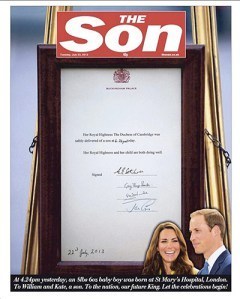
I care deeply about many things, as you know. But here are a few things, on this special day, that I don’t care about. I don’t care about the Royal Baby. I didn’t care yesterday when the news channels had whole teams of correspondents standing outside a private hospital, and a palace, and the village shop in a village, essentially covering nothing, as it happened. I didn’t care whether it was a going to be a boy or a girl, and I don’t care that it is a boy. It’s not that I don’t care about its health or happiness. It is simply the most privileged of around 2,000 babies born in Britain yesterday, and I wish health and happiness on all of them, because why wouldn’t I? They are blameless little individuals. But I don’t care that the baby born in the private hospital in London yesterday with the mad people camping outside is third in line to the throne. I don’t care who is and who isn’t in line to this throne, as this appears to be the 21st century and I simply cannot understand where there is a “throne” to which babies are entitled even before their umbilical cord is cut. I don’t care about the baby’s parents, or what they will call their baby, as I don’t know them or it, and it’s none of my business. David Cameron said that “the whole country” was “excited” about the birth, but since I know for certain that I wasn’t, then this is a misleading generalisation.
I don’t care that The King’s Troop Royal Horse Artillery will ride past Buckingham Palace to stage a 41-gun royal salute in Green Park at 2pm today. I don’t care that at the Tower of London, there will be a 62-gun salute from the Gun Wharf by the Honourable Artillery Company. I certainly don’t care that a royal gun salute normally comprises 21 rounds, increased to 41 if fired from a royal park or residence. (The Guardian seems to think I do, as that’s where I gleaned that information.) I don’t care that the Tower gets an extra 21 for the citizens of the City of London to show their loyalty to the monarch. I don’t have any loyalty to the monarch, past or future, as I didn’t vote for them. (Sorry, old Monty Python reference.)



I don’t care about the “ornate easel” put up outside Buckingham Palace last night, upon which the foolscap bulletin announcing details of the birth to the world was placed (and which typed sheet of A4 is the single cover image of more than one newspaper today). On a spectrum of giving a shit, the mad people in the Union Jack hats saying things to BBC News like “Princess Diana is shining down on them” and that this was “the people’s pregnancy” are at 10, and I’m at nought. Did I mention that I don’t care?
I don’t care that the baby is destined to be the 43rd monarch since William the Conqueror obtained the English crown in 1066. (Or at least, I’m half-interested in the history that took us to this point, but not in the idea that it still has any bearing on my life.) I don’t care that the baby was delivered at 4.24pm in the exclusive Lindo wing at St Mary’s hospital, Paddington, or that the Duke of Cambridge said, “We could not be happier.” It seems to me that we spent most of yesterday fixated on the dilation of a woman’s cervix, which really doesn’t seem like something complete strangers should do.
I certainly don’t care that the most privileged baby in Britain weighs 8lbs 6oz, which is close to the national average. It’s the only aspect of the baby that is close to any kind of average.

If you care, I do not deny you the pleasure that this birth offers. I am not trying to stop anybody caring, or having a street party, or giving a bow or a curtsey to the television. I’m just expressing a view which made me feel like an alien on my own planet when I walked into the newsagent this morning. (I was going to say foreigner in my own land, but of course, the foreigners are just as mad for it.)
I watched The White Queen on Sunday night. It was all about what life used to be like in the olden days when we had kings and queens and court and ladies in waiting and all sorts of crazy, antiquated stuff. I’m glad I live in modern times.


Eat, pray, shop
 Sorry, got distracted this week on Telly Addict by a gloriously pointless and condescending documentary on BBC1, Britain’s Favourite Supermarket Foods, which ought to have been on CBBC, except it might have been rejected by that channel’s core audience for being too facile (but full marks to presenter Cherry Healey for giving it her all). More meat was to be found on the estate-set drama Run on C4, a four-parter so unrelentingly grim I decided not to watch it over the prescribed four consecutive night, but spread its grimness out over four weeks; Family Tree on BBC2 was an expectedly gentle comic treat; there was more humanity on Route Masters on BBC2; The Americans pulled me back in on ITV; and law-firm fixer procedural Ray Donovan from Showtime made a big impression on Sky Atlantic. But what is Britain’s favourite supermarket food? Find out in part two next week. I expect.
Sorry, got distracted this week on Telly Addict by a gloriously pointless and condescending documentary on BBC1, Britain’s Favourite Supermarket Foods, which ought to have been on CBBC, except it might have been rejected by that channel’s core audience for being too facile (but full marks to presenter Cherry Healey for giving it her all). More meat was to be found on the estate-set drama Run on C4, a four-parter so unrelentingly grim I decided not to watch it over the prescribed four consecutive night, but spread its grimness out over four weeks; Family Tree on BBC2 was an expectedly gentle comic treat; there was more humanity on Route Masters on BBC2; The Americans pulled me back in on ITV; and law-firm fixer procedural Ray Donovan from Showtime made a big impression on Sky Atlantic. But what is Britain’s favourite supermarket food? Find out in part two next week. I expect.


July 22, 2013
Campaign for real whale

I’m republishing this review which I originally posted on 14 June, as people in the UK can now actually respond by going to see it! (I’ve been moved to re-post by the haunting trailer I keep seeing at the Curzon, and I fully intend to go and see the film again as a result. Also, it’s been getting some fantastically positive reviews, which vindicate my own feelings on seeing an early preview. Deep breath.)
This Friday, July 26, the documentary Blackfish is released in UK cinemas. It is one of the most heartbreaking films I have ever seen. It tells the tragic tale of one specific captive killer whale, Tilikum, a 22.5 ft (6.9m) long, 12,000 pound (5,400 kg) bull who lives – if you can call it living – at SeaWorld in Orlando, Florida, where he still performs for whooping audiences. His name comes from the Chinook word for “friends, relations, tribe, nation, common people”, which is ironic when you think for longer than a few seconds about the fact that whales in swimming pools are by definition separated from their extended families. (Tilikum was captured in 1983 off the coast of Iceland, aged around three years old, and has lived in swimming pools for most of his showbiz life. While held at Sealand in British Columbia, his first “home”, he and two other orcas were herded, every night, into a “holding” pool just 20 ft (6.1m) deep and 28 ft (8.5m) in diameter.)
Blackfish was made by documentarian Gabriela Cowperthwaite, who did not start out with an agenda. She had, in fact, taken her kids to SeaWorld and bought into the whole corporate myth that these beautiful cetateans are not “forced” to perform their tricks and do so willingly out of a love for their human trainers. (The word “killer” is usually dropped in the official commentaries at these shows.) Having done the same thing myself in 1994, no matter how conflicted I felt at the time about seeing two whales doing tricks for fish at what was then Marine World Africa USA in Vallejo, California, it has haunted me ever since and hardened my anti-zoo stance. I guess I am the choir to which the film could be accused of preaching to, although it’s hard to imagine why any right-thinking person would be happy about large, social marine mammals being kept in prison when they’ve committed no crime.
The orca is an apex predator, but has never attacked a human in the wild. Incidents of whales “turning on” their trainers, however, are more common than you might idly think. The engine that drove Gabriela to make her film was the awful death on February 24, 2010, of experienced trainer Dawn Brancheau at Orlando, which was witnessed, unknowingly, by a whooping audience. The precise cause of death is still murky, but Brancheau seems to have been pulled by Tilikum into the water by her ponytail, possibly in a moment of confusion over fish.
The whales performing on that occasion had been unresponsive and agitated, and only get fish after successfully effecting a trick, so they were especially hungry. Eyewitness accounts differ. Brancheau’s autopsy indicated “death by drowning” and “blunt force trauma”, and noted a severed spinal cord, and “sustained fractures” to her jawbone, ribs and a cervical vertebra.
SeaWorld was fined $75,000 by the Occupational Safety and Health Administration but insists that OSHA’s findings are “unfounded”. The implication, as ever in cases like this, is that human error led to the tragedy. This was the story instantly spun around the death at a Cumbrian safari park of zookeeper Sarah McClay, killed by a Sumatran tiger. The news media ensures that our first reaction to the story is never, “What is a tiger doing living in Cumbria?”

You will learn more about all this in the haunting film, which provides plentiful context: historical, behavioural, neurological (orcas have a section of brain that even clever old humans don’t have) and, yes, emotional. It may make you cry. I met Gabriela at a private VIP screening of Blackfish in June laid on by distributor Dogwoof for representatives of various NGOs and activist groups (you might say a “captive audience” if the phrase wasn’t so inappropriate!) and she is a calm, logical, unhysterical advocate of basic commonsense in this area. Here she is.
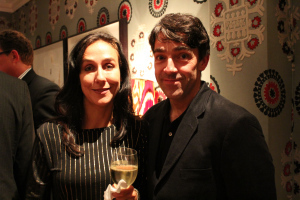
In her film, she speaks to a whole parade of ex-SeaWorld trainers, who confirm that incredible bond between animal and human, but who still question the motivation behind SeaWorld’s entire business model. The marine park chain currently has 22 killer whales in captivity, which remain big box office. For them, it’s all about money and turnstiles. And why wouldn’t it be? They’re a corporation. Blackfish is as much a critique of corporate America as it is of animal cruelty. (You won’t be surprised that SeaWorld refused to put up a representative to speak on camera, although transcripts of their defence at a previous court case speak volumes.)
I refrain from urging anyone to see a film. There may be issues closer to home than Orlando that come higher up your priority list. You may simply think: well it’s obviously wrong that massive whales are kept in a zoo, I don’t need to see a film about it to have my beliefs hardened. It’s not a snuff movie – you don’t actually see any trainers die, but you do see the bloody damage distressed whales do to each other when cooped up, and you do see some unprecedented “behaviours” which rather suggest psychological damage. Poor Tilikum seems mostly to be kept as a sperm bank these days. (He’s “sired” 21 offspring in his time, 11 of which are still alive.)
Artificial insemination is a common practice in animal husbandry, on farms, at stables, in zoos and elsewhere, and it’s done for reasons of conservation as well as commerce. However, you might find the sheer scale of doing it to a killer whale rather disturbing. Maybe those are double standards, I don’t know, but I love killer whales. When I saw one in Vallejo in 1994 and sat right up against the glass of its viewing pool while it swam past my nose, I felt privileged to have seen it. And then sick that I had seen it in that unnatural setting.
I have a recurring dream which I’ve mentioned before, in which I am close to the edge of a pool in which huge killer whales are swimming. But it’s not a nightmare. I am terrified of falling in, and in awe of the whales, but I never do fall in, and they never harm me. No need to analyse that one, Freudians.
Oh, and I urge you to see Blackfish if it’s showing near you. (Damn!)


July 19, 2013
I am a free man!

Having struck a chord with what turned out to be one of my most-read blog entries in June, Keeping up appearance fees, in which I railed against a mission creep within the media whereby contributors are expected to contribute their expertise for free, it may seem counterintuitive to have launched a second blog.



Let me explain. Blogging has always been free. I started this one in 2006 because, after a number of years broadcasting every weekday on 6 Music I’d moved to weekends, and found the daily blog I started on the station’s website a fun way of staying in touch with the listeners during the week. I moved over to Blogger in order to a) relieve me of the workload pressure of writing every day, and b) relieve me of the editorial pressure of doing so on a BBC website. I’ve been tapping out my thoughts ever since.
A childhood diarist, I used to use the blog as a place to post bulletins from my ordinary everyday life. But this solipsistic approach has hardened into something a little more formal, and a little less revealing since 2007. I can’t imagine how I can have become more busy since the punishing days when I was a DJ, author and scriptwriter in the late noughties, but I find myself going for a whole week sometimes without blogging now. If it weren’t for my weekly alert for Telly Addict, which takes five minutes to write, the gaps would be longer. But when something’s on my mind, it’s a unique outlet, with a surprisingly large available audience, thanks to Twitter.


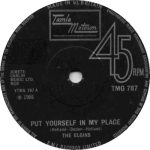
The new blog, Circles Of Life: The 143, came to me in early July, when I felt an urge not just to catalogue the best 143 songs of all time, but to write a short, personal essay about each one, and do so in an aesthetically pleasing manner and gradually. So it came to pass.
Because these entries about individual songs are by their nature fairly brief, I feel I can snack on them, publishing them as and when I have the spare time in an otherwise busy day. So far, I’ve published 13. Only 130 to go. I quite like not knowing how long it will take, and I love the freedom to mould the list as I commit it to the public domain. (It’s based on an actual playlist I made for my iPod earlier this year, and only one song is permitted per artist; I’ve already added, dropped, altered and replaced quite a few as I’ve catalogued them in The 143. It is the compiler’s right to do so.)
Anyway, have a look if music is one of your lifelong passions. Compared to the numbers under the bonnet on this blog, the following is modest, and not all that vocal. But a “soft launch” was my aim, and a soft launch it has been.
It was very kind of the esteemed David Hepworth to blog and Tweet about it earlier today. Numbers have risen as a result. So I’m officially “hard-launching” it here. What I wanted to say was: yes, I’m writing prose for free. I’m not trying to get a book deal, or even an eBook deal. I’m not trying to get a job. But rather than wait around for a publication to pay me to write about music, I’m doing it anyway. For fun. Barney Hoskyns’ campaign to withhold freelance labour from those who would exploit us is something I’m right behind. But since nobody asked me to write about my 143 favourite songs, I don’t feel I am exploiting myself in doing this.
I’ve spent much of my professional life writing about music; for around seven years, I did this while on the staff of three consecutive music publications, thereafter in a freelance, per-word capacity. But when Word calamitously went down a year ago, I lost my main outlet for paid music writing. (The Times dallied with me for a while, but lost interest – hey, commissioning editors change jobs, you fall in and out of favour, it’s a cruel world.)
I’ve grown quickly fond of The 143 blog. I like the “theme” I’ve chosen from WordPress. I’m quietly proud of the 999-based montage I made on my scanner and with very basic “effects” software. And I hope you enjoy reading my free essays. There’s nothing to you can do recompense me for them. That’s not the idea. But if you enjoy them and have something to say, post a few words, follow the blog, and that will be payment enough. It’s all about the music in any case.

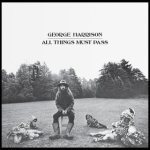



July 16, 2013
Comedy is subjective
 There’s a much longer essay to write about the subjectivity of our appreciation of comedy and the problems this creates for meaningful debate, but I touch on it in this week’s Telly Addict, with the news that The Wright Way has been axed because of Twitter (or something) and the way Count Arthur Strong completely divided opinion on that now all-powerful critical forum. Also, the arrival of the Oscar-winning Jane Campion’s Top Of The Lake on BBC2; some interesting intersections between it, The Returned and Hannibal; and two quite appalling documentaries from BBC1 from under the Cost Of Living Season banner, which will have made George Osborne and Iain Duncan-Smith happy, if nothing else: The Great British Budget Menu and Nick & Margaret: We All Pay Your Benefits.
There’s a much longer essay to write about the subjectivity of our appreciation of comedy and the problems this creates for meaningful debate, but I touch on it in this week’s Telly Addict, with the news that The Wright Way has been axed because of Twitter (or something) and the way Count Arthur Strong completely divided opinion on that now all-powerful critical forum. Also, the arrival of the Oscar-winning Jane Campion’s Top Of The Lake on BBC2; some interesting intersections between it, The Returned and Hannibal; and two quite appalling documentaries from BBC1 from under the Cost Of Living Season banner, which will have made George Osborne and Iain Duncan-Smith happy, if nothing else: The Great British Budget Menu and Nick & Margaret: We All Pay Your Benefits.


July 9, 2013
Geek ending

Honestly, you wait ages for a male-bonding apocalypse comedy, and then two come along at once, like computer-animated ant fables, Truman Capote biopics or volcano-based disaster movies. Except Seth Rogen and Evan Goldberg’s This Is The End wasn’t the end of the world. The World’s End is.
I’ve been so looking forward to sharing my thoughts about the third and final part in Simon Pegg, Nick Frost and Edgar Wright’s audacious Three Flavours Cornetto trilogy – completing the set with Shaun Of The Dead and Hot Fuzz – ever since I saw the first 45 minutes of it, at an exclusive preview in mid-May. (We signed a press embargo when we saw the whole thing last Wednesday, but this apparently lifted last night when Variety went live, and all the other reviews crashed in behind them.)
Because the film’s release date was “pulled forward”, to use the impenetrable industry jargon, by a month, there has been a certain amount of frenzied activity behind the scenes at The World’s End as it was readied for public consumption, which is why selected journalists with long lead-times were treated to the weirdest screening ever: the first half of a film. (It was even introduced by Edgar.) In it, Pegg’s boorish Gary, the hedonistic goth who refused to grow up and is first seen in rehab, gets the old gang back together to stage a second attempt, 20 years on, at their old hometown’s “Golden Mile” 12-hostelry pub crawl. (The town is Newton Haven, played by two “garden cities”, Letchworth and Welwyn, which join Crouch End and Wells in Somerset on the Cornetto map.)
The gang – who have all inconveniently grown up in the interim and view the developmentally arrested Gary as something of a necessary irritant – are played by regulars Nick Frost, Martin Freeman, Paddy Considine and Eddie Marsan, and a finer bunch of British avengers you could not hope to assemble. (Rafe Spall and Julia Deakin also have small parts, which means they have been in all three films, along with Pegg, Frost and Freeman.) In those first 45 minutes, we get a keenly observed and deeply self-critical portrait of misspent adulthood, which does Pegg, Frost and Wright – all essentially huddled around the big four-oh – proud.
Wright is still haunted by a crawl he never completed in his youth, and his own nostalgia and self-examination seem to fuel the story – as well as provide the soundtrack of iconic early-90s indie-dance-crossover tunes that are not heard in films as often as, say, 60s beat hits, or mid-90s Britpop. (When the lads groove to the Soup Dragons’ I’m Free in Gary’s car, it’s all good, clean, I ♥ The 90s fun until he reveals that not only is this the same compilation cassette from 20 years ago, it’s also the same car. For this, he is regarded as comically tragic by the others. But who doesn’t cling to simpler times?)
When I interviewed the trio last Tuesday in Claridge’s I still hadn’t seen the second half of the film we were there to discuss. This would ordinarily be intolerable – the height of film studio arrogance and cheek. But hey, it really was not quite finished yet. We all saw it on Wednesday. For those of us who’d seen the first 45 minutes – which ended with the first clue that all was not of this earth in Newton Haven – it was odd to see the run-up again, but, like all of their best work, it’s worth repeating, and in fact matures.

It’s a terrific film, confident, silly, warm and surprising, and a worthy finale to an insane, parochial cinematic adventure. Don’t worry: I won’t tell you anything key about the plot, or where the third Cornetto comes in, or reveal a couple of well-kept casting secrets, as it’s not out until next week. Pegg, Frost and Wright were being extra careful last Tuesday, mouthing names to each other, and playing a guessing game about an extra audio detail Wright had inserted into the final sound mix. When you set this much store by details, metatextuality, in-jokes, paybacks and cross-references, it’s important to handle them with care. The title – and the trailer – are pretty explicit about the apocalyptic end-point, but not the getting there, other than it involves hand to hand combat, at one juncture with pub stools for weapons. It also gives away a sight gag that refers back to Shaun and Hot Fuzz, although knowing about it does not subtract from the glee of seeing it.
My admiration for the work Pegg, Frost and Wright do as a fighting unit – and although Wright is very definitely the director, and Pegg and Wright credited with the script, it’s clear Frost is closely consulted throughout – is very high. To adapt the fanboy fun of Spaced to work across a broad canvas, not to mention sell it to the Americans, has been one of the more heartwarming successes of British cinema in the 21st century. (The support they’ve had from Working Title and Universal, as well as Big Talk, is key, too, but these guys are the ones with the ideas and the pre-midlife crises to draw on.)
This geek ending is final in every sense. It’s bigger and costlier than the previous two films, but as good rather than better. To have kept their end up, to the end, is reward enough. I always enjoy seeing Pegg and Frost in other stuff, and Wright will easily adapt to a Hollywood career if he wishes it, but there’s nothing to beat the three of them in a room together, and you have to hope they’ll reunite through a cosmic need to do so, rather than a financial imperative.
Having met the clubbable Pegg and Frost during press for Hot Fuzz, and struck a surprising seam of mutual admiration with Pegg (ie. he’d read my books, which had been given to him by a mutual Northampton-based friend, Tony Kirkland, with whom I co-starred in a Weston Favell Upper School production of Macbeth in 1983), I was lucky enough to reflect in the collective glory of the whole Spaced gang at a BFI reunion day in November 2007, where I first met Edgar and crossed that Rubicon where we might actually say hello in the street. They’ve all been kind to me ever since whenever our paths have crossed, and Simon gave me a cover quote for my non-selling third memoir, which I still treasure: “Fucking hilarious.” As is often the case when you meet cool people professionally, you start out as a fan, gain their trust, and became something slightly less needy. (But remain a fan.) Here’s me unable to hide my enjoyment onstage at NFT1.
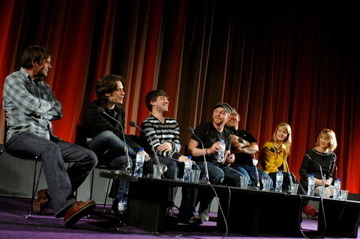
I’ve read all the reviews that went up last night. Most critics have been impressed by the scale; which is to say, the bigness of the sci-fi half, but also the intimacy of the first, without which the second half would just be big. Even when things are credibly sci-fi, they remain just as credibly real, thanks to the chemistry of Pegg and Frost first and foremost, but among the other cast, too. One or two have said it’s too long at 109 minutes, but I found that even when the big stuff hits a plateau of destruction, it’s always cleverly undercut by the matey and often foul-mouthed dialogue. That comes from practice, I’d say. I could watch it again now, and that would mean seeing the first 45 minutes for the third time.
The World’s End is released next Friday, July 19, and if you are fond of the other two films and the sitcom from whence they came, you’ll be first through the doors, and you won’t want to leave at last orders. This Is The End is still on general release. Let’s Boo-Boo.


Andrew Collins's Blog
- Andrew Collins's profile
- 8 followers



